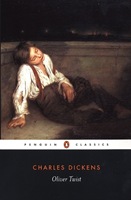 Title: Oliver Twist by Charles Dickens
Title: Oliver Twist by Charles Dickens
Release Date: Originally published in 1838
Pages: 554 pages
Genre: Historical Fiction
Goodreads Summary: The story of the orphan Oliver, who runs away from the workhouse only to be taken in by a den of thieves, shocked readers when it was first published. Dickens's tale of childhood innocence beset by evil depicts the dark criminal underworld of a London peopled by vivid and memorable characters—the arch-villain Fagin, the artful Dodger, the menacing Bill Sikes and the prostitute Nancy. Combining elements of Gothic Romance, the Newgate Novel and popular melodrama, Dickens created an entirely new kind of fiction, scathing in its indictment of a cruel society, and pervaded by an unforgettable sense of threat and mystery.
I know most bookish types have read most of the classics but Oliver Twist somehow flew under my radar for all these years. I was recently given the opportunity to review it professionally and I jumped at the chance to read the story that I thought I knew through movies and popular culture. While I didn’t hate Oliver Twist, I didn’t like it that much either.
Oliver Twist is of course the story of the poor, starving orphan boy who has the audacity to ask for more food and feels the wrath of the workhouse administrators afterwards. He runs away, gets taken in by a gang of thieves and through a series of events, ends up with his own happily ever after.
It’s easy to see that Dickens used this story to highlight the injustices of England’s Poor Laws and his disdain for economically advantageous marriages. Admittedly, it is shocking to read how deplorably the poor and homeless people were treated and this aspect of the book I thought was very well done.
My issues with the novel involve the length, unnecessary plot lines and mostly importantly, the bigoted and highly stereotypical character, Fagin. This book is unnecessarily long. I had no idea until KM from One Page At A Time told me that Dickens was paid by the word and that explains a lot. The novel was also published in chapters so I guess Dickens had to have enough story for each chapter but this novel could really have been much shorter to get the point across. I also thought the entire story line of Rose and Harry was used to show us what a ‘good’ love marriage was supposed to be like as opposed to all the ‘bad’ arranged marriages in the novel. It could easily have been cut.
And of course, there is Fagin: the devilish, greedy, conniving leader of the gang of juvenile pickpockets. I’m not overly politically correct you guys. If Fagin was the villain who happened to be Jewish, I wouldn’t really be an issue for me. BUT, Fagin’s villainy and the fact that he is Jewish seem to be tied together and it did not sit well with me. The fact that he is referred to as “the Jew” bothered me every time I read it. I’m not sure what the reaction to this stereotype was in 1838, but it certainly would not be OK if this was written today.
Overall, I can see why this book was impactful at the time but it is also a bit fantasy like in the serendipitous way that Oliver, in the large city of London, just happens to connect with exactly the right people he needs to uncover the mystery of his identity and life. I know a lot of people adore this story but it was not for me.
Content: Kissing and violence.
My Rating: Just fine

3 comments:
I don't blame you. I never got into DIckens either.
YOU FINISHED!!! YAYYY!!! *claps* Yeah, Dickens is rough. For me, he wrote some great stories; but I hated his actual writing style. And Oliver Twist is one of my least favorites. Little Dorrit and Great Expectations were better IMHO.
And it's funny you bring up the prejudice with Fagin being Jewish. I remember being in a college class where we read Dickens, and lots of people complained about his prejudices. But tons of people had prejudices back then, it was just part of the culture. I find it interesting that Dickens felt bad enough for the underclasses (like he portrays in Oliver) but not for minorities like Jews. You'd think he would be compassionate toward them all; guess not. lol
Congrats on finishing! I am proud of having read this after being more familiar with the musical version and just seeing what was originally written.
I also read that later in life Dickens revised the book to remove his antisemitic remarks-see wikipedia
Post a Comment